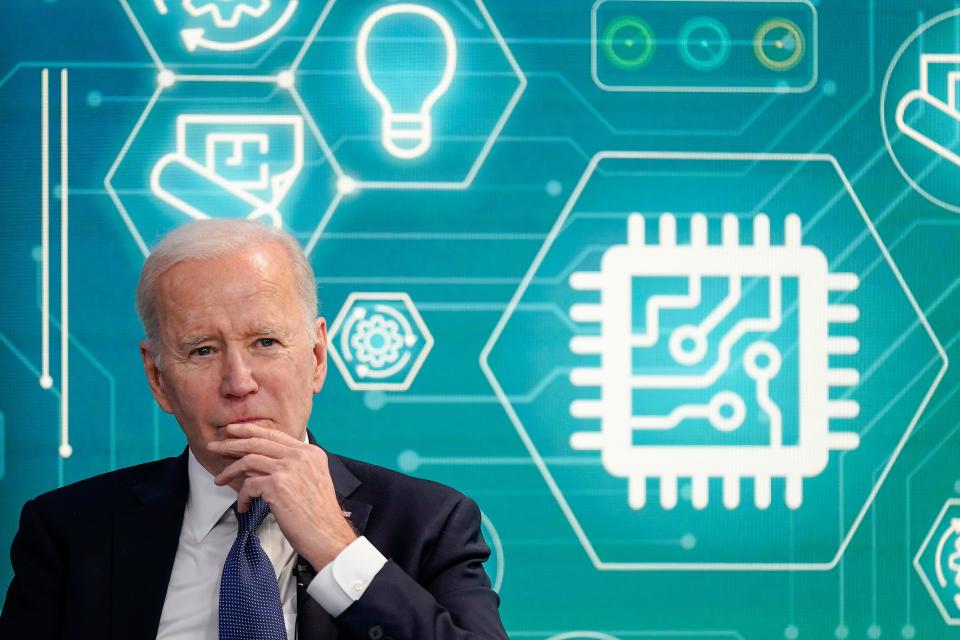Child care a requirement for chip makers seeking billions in incentives under Biden rules
- Oops!Something went wrong.Please try again later.
WASHINGTON — The Biden administration is requiring that microchip companies competing for a slice of $39 billion in federal incentives provide perhaps the biggest need for working parents: child care.
The Commerce Department is set to release parameters Tuesday for semiconductor companies who apply for federal assistance to build commercial manufacturing facilities through the $50 billions Chips and Science Act, which Congress approved last year.
Biden wants to transform the U.S. economy over the next decade to compete with China in the domestic manufacturing of leading-edge chips that are essential for smartphones, computers and cars.
But the effort faces a shortage of workers skilled in the field. That's why the Biden administration is mandating companies seeking at least $150 million in aid submit plans to offer workers – inside the facilities and during construction – access to high-quality, affordable child care.
The goal: remove a common barrier preventing many Americans, particularly women, from entering the workforce.
More: 'America is delivering': Biden signs bipartisan computer chips bill into law
More: Where is child care most expensive? New labor department data breaks down costs by county
Inside the push to mobilize US around chip production
The U.S. produces just 12% of the world's microchips, down from 37% in the early 1990s. The Biden administration is trying to spur greater investment of chip production at home so the U.S. is less reliant on other nations and their supply chains.
The White House is eyeing at least two large-scale "semiconductor clusters." Each would employ about 10,000 workers and include a leading-edge microchip fabrication plant, research and development facilities, a robust suppler ecosystem and specialized infrastructure.
In addition to child care, companies must provide workforce development plans, demonstrate sound financial models and show how their products will "advance U.S. economic and national security," among other requirements to receive grants, loans or other assistance.
The Commerce Department will begin accepting chip applications June 26 before formal evaluations. Officials say the total value of federal aid could reach $75 billion when including potential loan guarantees awarded to companies.

Making the Rust Belt the chips belt
Biden has talked about turning depleted factory towns in the Rust Belt and elsewhere into the hotbeds of a new future for manufacturing based on chips.
Already, the world's largest semiconductor manufacturer, Intel, is moving ahead on a $20 billion complex outside of Columbus, Ohio, with plans for up to eight factories and $100 billion if awarded funds from the Chips Act.
Biden's Chips for America push, projected to create hundreds of thousands of new jobs, ties directly to his economic message to working-class voters who have increasingly abandoned the Democratic Party.
More: As Biden prepares 2024 reelection run, Democrats worry blue-collar voters are slipping away
How child care shortage affects the economy
Child care is part of that blue-collar pitch, particularly for women, who currently make up just 29% of the manufacturing labor workforce.
A lack of child care options for infants and toddlers costs the U.S. $122 billion annually in lost earnings and productivity, according to a new report from the Council for a Strong America, a bipartisan nonprofit.
More: How affordable is child care near me? Search our database of day care prices by county
As part of his Build Back Better domestic agenda, Biden proposed a $276 billion national child care plan for low- and middle-income parents with children up to 5 years. But the president in 2021 scrapped the proposal, which lacked support in the then-evenly divided Senate.

What they're saying
Commerce Secretary Gina Raimondo said the goal is to double the nation's semiconductor workforce over 10 years. But right now there's a "math problem," she said. "We need more people in the labor force. We right now lack affordable child care, which is the single most significant factor keeping people, especially women, out of the labor force."
Raimondo vowed there will be no "blank checks" for applying companies. "We're gonna make companies open their books to receive funding. I suspect a lot of companies are going to have to work harder than they thought they would in order to receive the funding."
Sen. Patty Murry, D-Wash., who chairs the Senate Appropriations Committee, called the child care provision an "important, commonsense step that recognizes a really basic reality: you can’t bring back manufacturing in America without workers – and those workers need child care."
Reach Joey Garrison on Twitter @Joeygarrison.
This article originally appeared on USA TODAY: Child care required from chip makers applying for federal funds

